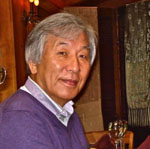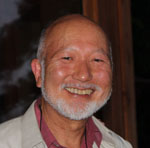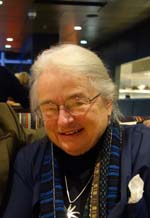>> Programmatic Historical Elements

- >> Program Origin
- >> Founders
- >> Japan Partners
Program Origin
The E.S. Morse Scholar Exchange Program is a continuous, collaborative scholar exchange with the following objectives:
• Create a community of scholars
• Strengthen our international collaboration
• Open this exchange concept to both senior scholars (faculty)
and junior scholars (undergraduate students, graduate students and postdocs)

Edward S. Morse began this exchange of scholars between Japan and the United States in the 1870s, leaving a legacy that we now seek to formalize and support for future collaborations in our shared Pacific Ocean environment.
This exchange program, initiated in 2012, is for Japanese and U.S. undergraduate students, graduate students, post doctoral associates and early faculty members. Scholars and fellows take part in experiences in research, teaching, course work and other interactions in Marine Biology at the Akajima Marine Science Laboratory, the University of Tokyo Misaki Marine Biological Station, the University of Tsukuba Shimoda Marine Research Center, the Nagoya University Sugashima Marine Biological Laboratory, and the University of Washington Friday Harbor Laboratories.
Founders Drs. Makoto Omori, Motonori Hoshi and Trish Morse with junior member of the Morse Institute, Kazunori Yamamoto.
All these marine facilities have benefited from exchanges in the past, with close collaborations among scientists evolving over the years. These connections usually occur at an early stage in the scientist's career, but the impact of the friendships, discoveries and intellectual exchanges last forever.
For those students presently involved in marine research and learning, costs associated with transportation, room and board, and laboratory facilities have risen precipitously and are especially difficult for visiting scientists in other countries. The shared Pacific Ocean has a particular relevance to Japanese and US scientists. We are at an exciting time where there is need to increase our scientific findings related to marine organisms, their environment, environmental catastrophes such as acidification, and the decreasing food resources. The innovative applications of molecular studies of organisms, of new visualization technologies, of computer resources including large-scale modeling and translating large amounts of data all are central to the importance of international exchanges. More and more world decisions are based on a common language of scientific evidence and knowledge to preserve marine resources for all people.
Japan and the United States share a distinguished scientist who had a remarkable history with Japan 150 years ago. Edward Sylvester Morse (1838 - 1925) received his understanding of natural history at Harvard University in the laboratory of Professor Louis Agassiz, the founder of the Harvard Museum of Comparative Zoology. Morse is a member of the U.S. National Academy of Sciences and holds four honorary doctorates, from Bowdoin College (1871), Harvard University (1892), Yale University (1918) and Tufts University (1922). Early in his career, in 1877 he visited Japan to collect brachiopods and shortly after his arrival, was invited to be the first Professor of Zoology in Japan and develop natural history and zoological studies at the University of Tokyo. During his time in Japan Professor Morse created the first marine laboratory at Enoshima, established scientific studies on the evolution of the Brachiopoda, and brought the studies of evolution and zoology to Japanese students and into the Japanese science classrooms. He also discovered the ancient shell Mounds of Omori and dug a collection of ancient Japanese pottery still on display at the University of Tokyo. Later at the Peabody Museum in Salem, Massachusetts, Morse wrote an account of Japan Day by Day, with precise illustrations of the Japanese homes and their surroundings, and researched the ancient Japanese pottery formulating a catalog that has also been translated into Japanese. Morse curated two collections of the ancient and modern pottery, one in Japan and one in the Boston Museum of Fine Arts. Professor Morse was president of the American Association for the Advancement of Science (AAAS).
One hundred and fifty years later, Japanese and US scientists have continued to exchange visits to the shores of these two countries, and it is this legacy that we wish to perpetuate by creating an endowed program for such scientific interactions. Students and young faculty are in need of monetary support for this experience, for travel, room and board, and tuition (if a course is part of the experience). Money raised for this endowment will insure these exchanges for the future that are so valuable in our international understanding of marine biology along the shores of both of our countries. Scientists are named Junior Scholars (graduate students, post-doctoral students), Senior Scholars (established scientists) and Honorary Scholars (Distinguished Pre-program exchange scholars) in the Edward Sylvester Morse Institute.
Founders

Motonori Hoshi
Professor Motonori Hoshi (known to the community as “Ghen”) is currently a professor at the Open University of Japan. He received his Doctorate at the University of Tokyo. He has taught at Hokkaido University, Nagoya University and at the Tokyo Institute of Technology where he served at Department of Life Sciences Chair, Dean and Vice President. His research is in the field of invertebrate reproductive Biology, particularly on molecular mechanisms underlying gamete interaction and on gamete glyco- conjugates. Professor Hoshi has over 200 publications and numerous book chapters. His numerous honors include honorary membership in the International Society of Invertebrate Reproduction, Fellow of the American Association for the Advancement of Science (AAAS), Miller Visiting Professorship at the University of California – Berkeley, and honorary member of the Zoological Society of Japan. He has served as Editor for academic journals, and President of the International Society of Invertebrate Reproduction and Development Zoological Society of Japan, Japan-Italy Society of Biology and International Union of Biological Sciences. He serves as a member of the Science Council of Japan and Senior Academic Advisor of the Japan Society for the Promotion of Science.

Makato Omori
Professor Makoto Omori (known to the Community as “Mac”) has had a long interaction with the University of Washington, in the Department of Oceanography and visiting the Friday Harbor Laboratories. With a Ph.D. from Hokkaido University, he held positions in the Ocean Research Institute at the university of Tokyo, and the Tokyo University of Fisheries. In his later professional years in Japan, he was the Director of the Akajima Marine Science Laboratory, situated on Aka Island, a part of the Kerama Islands, Okinawa. Dr. Omori is well known for his planktonic studies and served as President of the Plankton Society of Japan. He developed successful methods for restoration and remediation of coral reefs. He has over 200 publications and tis he author of 12 books. Among his interests include a publication on Crustaceans on postage stamps from 1870. At present he continues climbing challenging mountains all over the world!

M. Patricia Morse
Professor M. Patricia Morse (known to the community as “Trish”) is a marine biologist and science educator at the University of Washington. For thirty-four years, she was Professor of Biology at Northeastern University. The last four of those years were spent as a Program Director at the National Science Foundation (NSF) in the Division of Elementary, Secondary and Informal Education. After this, four years were spent teaching in the Biology Department at the University of Washington in Seattle. Trish holds a BS degree from Bates College, an MS and Ph.D. from the University of New Hampshire, and an honorary D.Sc. from Plymouth State College. She is the third recipient of the American Institute for Biological Sciences (AIBS) Education Award. She has published over 50 papers and 34 abstracts in molluscan biology and more recently published in science education. Morse is a past president of Sigma Xi, the Scientific Research Society and the American Society of Zoologist (now the Society for Integrative and Comparative Biology - SICB), and is a Fellow of the American Association for the Advancement of Science (AAAS). SICB recently named an award for science education in her name. For 36 years she served on the Board of Trustees at Bates College in Maine. She recently served as chair of a National Academies of Sciences NRC Committee on “Attracting Science and Mathematics Ph.Ds. to K-12 Education. Now Professor emerita, she holds an appointment of Visiting Scholar on the Faculty of the Biology Department at the University of Washington.
Japanese Partners Collaborating with the Scholar Exchange Program
- Misaki Marine Biological Station
- >> MMBS Formal Agreement Statement (PDF)
- Akajima Marine Science Laboratory
- Shimoda Marine Research Center
- Sugashima Marine Biological Laboratory
